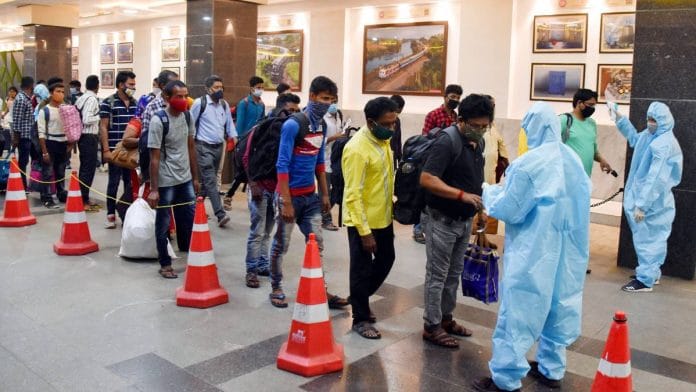Mumbai: The Brihanmumbai Municipal Corporation (BMC) is gearing up to expand Covid-19 testing to nearly double its current tally, in some scenarios without the individual’s consent, after the city’s daily positivity rate shot up to 10 per cent from under 5 per cent last month. Mumbai also recorded a new peak in its daily case count Friday when 3,063 people tested positive for the coronavirus.
The civic body has set ambitious targets to conduct daily Rapid Antigen Tests (RAT) at all malls, bus depots, railway stations as well as its 24 administrative wards. Citizens have also been warned that anyone resisting the test or found being uncooperative will be booked under the Epidemic Act, 1897. Under this law, any person disobeying a regulation or order is punishable under Section 188 of the Indian Penal Code, with a maximum fine of Rs 1,000 and/or jail term of up to six months.
The BMC also plans to scale up vaccinations to one lakh doses daily from the current figure of less than 50,000. It has requested the Centre to increase the number of private centres allowed to administer vaccinations to 80 from the current 59.
“Rapid Antigen Tests at crowded places like malls, railway stations (for inbound trains), MSRTC (state road transport) bus depots, khau gullies, hawkers, market places, tourist places, various government offices, shall be done randomly. Tests will be carried out without the consent of citizens who are present at these crowded places. If the citizen refuses to test, it would amount to an offence under Epidemic Act, 1897,” the BMC said in a circular issued Saturday.
Mumbai has been one of India’s worst-hit cities, with positivity rates going as high as 20 per cent in the first six months of the pandemic. The test positivity rate — the number of samples testing positive out of a given total — is a key measure of the pandemic as it indicates the speed at which the disease is spreading. A higher number of tests is considered more conclusive, and helps bring down the positivity rate.
Though the city’s Covid trajectory recorded a decline in December, cases have been climbing again since February. In the past few days, the average daily tally rose to over 1,500 from about 500 in early February, but testing has yet to be scaled up in equal measure. This has weighed down the city’s daily test positivity to around 10 per cent.
Also read: 50% of India’s Covid cases are from Maharashtra but testing lags behind national average
Low testing numbers
Over the past seven days, the number of daily Covid tests in Mumbai has ranged from 15,697 to 24,542, with the daily positivity rate ranging from 8-12 per cent.
Mumbai’s tests-per-million statistic stands at 2.63 lakh. This means the city, which has a population of nearly two crore, has conducted 2.63 lakh tests for every 10 lakh people. This is much lower than cities such as Delhi or Bengaluru, which are conducting 6.30 lakh and 6.74 lakh tests per million population respectively.
A BMC official who did not wish to be named told ThePrint: “We have set a target of increasing testing to 50,000 a day from the current 25,000-odd tests. We will ramp up testing in phases and the decision to aggressively and compulsorily conduct Rapid Antigen Tests at crowded spots in Mumbai is a start.”
Antigen tests give quick results (within 30 minutes), but are less reliable than RT-PCR tests, considered the gold standard for Covid testing. RT-PCR test results could take up to a day or longer depending on the backlog. As of now, over 70 per cent of BMC’s Covid tests are RT-PCR.
The civic body is also considering setting up testing camps at large housing societies where cases are being found, the official added.
Also read: ‘People are behaving like Covid is over’ — what Maharashtra blames for sharp spike in cases
Crowded places like malls given testing targets
The BMC has drawn up a list of 27 major malls in the city and has given every mall a target of conducting at least 400 RATs daily.
Similarly, seven railway stations — Chhatrapati Shivaji Maharaj Terminus, Mumbai Central, Dadar (Central and Western), Bandra Terminus, Andheri, Borivali and Kurla’s Lokmanya Tilak Terminus — have been asked to randomly test 1,000 inbound passengers every day. Bus depots of the Maharashtra State Road Transport Corporation (MSRTC) too have been directed to test at least 1,000 passengers a day.
Each of the BMC’s 24 administrative wards have also been given a target of testing 1,000 persons a day, focusing on crowded places such as restaurants, hawkers, market places, tourist places and so on.
At the malls, the cost of the antigen tests will be borne by the people being tested, while at other places, it will be borne by the BMC, its statement noted.
People who have been tested in the previous 72 hours can carry their negative RT-PCR results while visiting these locations.
(Edited by Manasa Mohan)
Also read: As Covid declines, Indians are out shopping, dining, getting haircuts & crowding malls







Random testing is worse than lockdowns. Imagine going out to work in the morning and not knowing whether you will return home in the evening or end up in a detention center.
Taking people to a detention center based on something they cannot control (presence of virus inside the body) is exactly the same as discrimination based on religion, caste, race and gender (which are things people cannot control).
Sanjay Raut had indicated the power wielded by underworld earlier when the same SECULAR PARTIES were in POWER. So it’s not surprising what is happening now.
Ofcourse SECULAR JOURNALISTS blinded by prospects of making a fast buck chose silence over safety and security of common people.